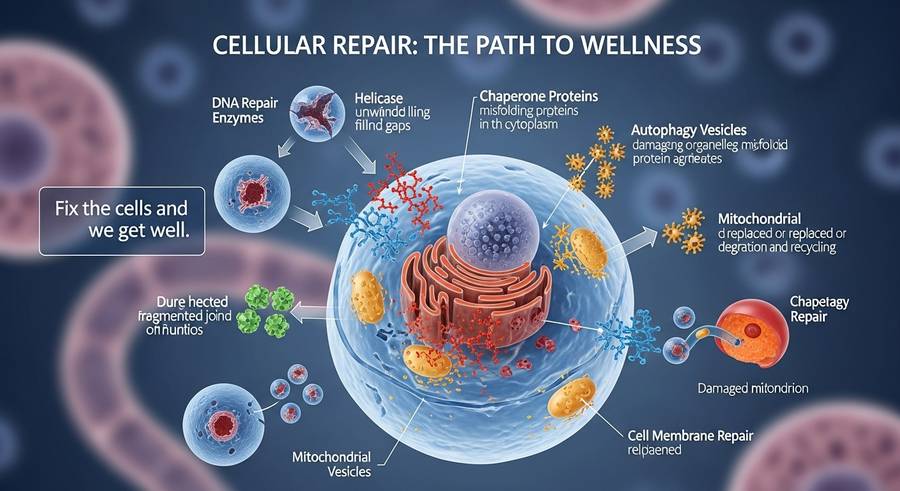
Introduction
The phrase "fix the cell we get well" encapsulates a fundamental principle in health and wellness. It suggests that true well-being originates at the cellular level. When our cells are functioning optimally, our bodies can effectively repair, regenerate, and resist disease, leading to overall health. This article explores the concept of cellular health and how we can support it.
Understanding Cellular Health
Our bodies are composed of trillions of cells, each performing specific functions essential for life. These cells require a constant supply of nutrients, oxygen, and proper waste removal to operate efficiently. When cellular function is compromised due to factors like poor nutrition, environmental toxins, stress, or aging, it can lead to a cascade of health problems. Conversely, when cells are healthy, they contribute to robust immune function, efficient energy production, and effective tissue repair.
Pillars of Cellular Well-being
Several key factors contribute to maintaining and improving cellular health:
Nutrition and Hydration
The building blocks for healthy cells come from the food we eat and the water we drink. A diet rich in whole, unprocessed foods provides essential vitamins, minerals, antioxidants, and healthy fats that cells need to thrive. Antioxidants, in particular, combat oxidative stress, a major contributor to cellular damage. Adequate hydration is also crucial for transporting nutrients to cells and removing waste products.
Exercise and Movement
Regular physical activity stimulates cellular repair mechanisms, improves mitochondrial function (the energy powerhouses of cells), and enhances circulation, ensuring cells receive adequate oxygen and nutrients. Exercise also helps in reducing inflammation, which can be detrimental to cellular health.
Sleep and Stress Management
During sleep, the body undertakes vital repair and regeneration processes at the cellular level. Chronic sleep deprivation can disrupt these processes, impairing cellular function and increasing vulnerability to disease. Similarly, chronic stress elevates cortisol levels, which can damage cells over time. Implementing stress management techniques like mindfulness, meditation, or yoga can protect cellular integrity.
Environmental Factors
Exposure to toxins in our environment, such as pollution, pesticides, and certain chemicals in personal care products, can negatively impact cellular health. Minimizing exposure to these toxins through conscious choices in diet, home products, and lifestyle can help protect cells from damage.
The Role of Supplements
While a balanced diet is paramount, certain supplements can play a supportive role in cellular health. These may include omega-3 fatty acids, vitamins D and C, magnesium, and various antioxidants. However, it's always advisable to consult with a healthcare professional before starting any new supplement regimen.
Conclusion
The principle of "fix the cell we get well" is a powerful reminder that our health is intrinsically linked to the health of our individual cells. By prioritizing nutrition, hydration, exercise, sleep, stress management, and minimizing environmental toxins, we can empower our cells to function optimally, leading to a foundation of lasting wellness.
Table of Contents
More info on cellular Repair
ADVERTISEMENT

Acumullit SA® Revolutionize Your Wellness with Pure Plant Power
Experience the future of wellness with Acumullit SA® technology from APLGO. Our unique process activates the natural power of whole food botanicals, creating highly absorbable nano-particles. These potent nutrients are then infused into delicious lozenge drops, designed to support your body's natural functions. From immune support to cognitive clarity and a radiant glow, discover a new level of vitality. Embrace the power of nature, refined by science.
